List of governors of Michigan
The governor of Michigan, is the head of government of Michigan and serves as the commander-in-chief of the state's military forces.[2] The governor has a duty to enforce state laws;[3] the power to either approve or veto appropriation bills passed by the Michigan Legislature;[4] the power to convene the legislature;[5] and the power to grant pardons, except in cases of impeachment.[6] The governor is also empowered to reorganize the executive branch of the state government.[7]
| Governor of Michigan | |
|---|---|
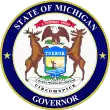 Seal of the Governor | |
 Flag of the Governor | |
| Style | Her Excellency[1] |
| Status | |
| Residence | Michigan Governor's Mansion |
| Term length | Four years, renewable once |
| Precursor | Governor of Michigan Territory |
| Inaugural holder | Stevens T. Mason |
| Formation | November 3, 1835 |
| Deputy | Lieutenant Governor of Michigan |
| Salary | $159,300 (2019) |
| Website | www |
In the 17th and 18th century, Michigan was part of French and then British holdings, and administered by their colonial governors. After becoming part of the United States, areas of what is today Michigan were part of the Northwest Territory, Indiana Territory and Illinois Territory, and administered by territorial governors. In 1805, the Michigan Territory was created, and five men served as territorial governors, until Michigan was granted statehood in 1837. Forty-eight individuals have held the position of state governor. The first female governor, Jennifer Granholm, served from 2003 to 2011.
After Michigan gained statehood, governors held the office for a 2-year term, until the 1963 Michigan Constitution changed the term to 4 years. The number of times an individual could hold the office was unlimited until a 1992 constitutional amendment imposed a lifetime term limit of two 4-year governorships. The longest-serving governor in Michigan's history was William Milliken, who was promoted from lieutenant governor after Governor George W. Romney resigned to become Secretary of Housing and Urban Development, then was elected to three further successive terms. The only governors to serve non-consecutive terms were John S. Barry and Frank Fitzgerald.
Governors
Michigan was part of New France until the Treaty of Paris transferred ownership of the region to Great Britain. During the period of French rule, it was governed by the Lieutenants General of New France until 1627, the Governors of New France from 1627 to 1663, and the Governors General of New France until the transfer to Great Britain. The Treaty of Paris, signed in 1783, ceded the territory that is now Michigan to the United States as part of the end of the Revolutionary War, but Britain did not release the territory to the United States until 1796 (Lower Peninsula), 1818 (Upper Peninsula) and 1827 (Drummond Island). During the period of British rule, their governors administered the area as part of the territorial holdings of British Indian Reserve, 1763-1774; Quebec, 1774-1791, and Lower Canada (Ontario), from 1791.[8]
Prior to becoming a separate territory in 1805, Michigan was administered as part of the Northwest Territory, 1789-1800; then divided between the Ohio Country and the new Indiana Territory, 1800-1803 (when the eastern half of the Lower Peninsula was transferred to Indiana upon Ohio achieving statehood). On June 30, 1805, the Territory of Michigan was created, with General William Hull as the first territorial governor.[8][9] Originally, the territory included only the Lower Peninsula and eastern tip of the Upper Peninsula. The rest of the Upper Peninsula remained part of Indiana Territory until creation of Illinois Territory in 1809. The entire Upper Peninsula was not attached to Michigan Territory until Illinois became a state in 1818, Indiana having become a state in 1816.
Governors of the Territory of Michigan
| No. | Governor | Term in office | Appointed by | |
|---|---|---|---|---|
| 1 |  |
William Hull | March 1, 1805 – October 29, 1813 |
Thomas Jefferson |
| 2 | 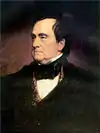 |
Lewis Cass | October 29, 1813 – August 6, 1831 |
James Madison |
| 3 | 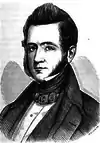 |
George Bryan Porter | August 6, 1831 – July 6, 1834[lower-alpha 1] |
Andrew Jackson |
| – | 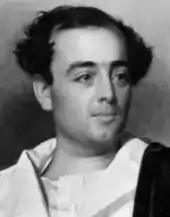 |
Stevens T. Mason | July 6, 1834[lower-alpha 1] – September 19, 1835 |
— |
| 4 | 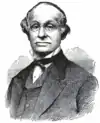 |
John S. Horner | September 19, 1835 – July 3, 1836[lower-alpha 2] |
Andrew Jackson |
Governors of the State of Michigan
Michigan was admitted to the Union on January 26, 1837. The original 1835 Constitution of Michigan provided for the election of a governor and a lieutenant governor every 2 years.[12] The fourth and current constitution of 1963 increased this term to four years.[13] There was no term limit on governors until a constitutional amendment effective in 1993 limited governors to two terms.[14]
Should the office of governor become vacant, the lieutenant governor becomes governor, followed in order of succession by the Secretary of State and the Attorney General.[15] Prior to the current constitution, the duties of the office would devolve upon the lieutenant governor, without that person actually becoming governor.[16] The term begins at noon on January 1 of the year following the election.[17] Prior to the 1963 constitution, the governor and lieutenant governor were elected through separate votes, allowing them to be from different parties. In 1963, this was changed, so that votes are cast jointly for a governor and lieutenant governor of the same party.[13][18]
| No. | Governor | Term in office | Party | Election | Lt. Governor[lower-alpha 3] | |||
|---|---|---|---|---|---|---|---|---|
| 1 |  |
Stevens T. Mason | November 3, 1835 – January 7, 1840 |
Democratic | 1835 [lower-alpha 2] |
Edward Mundy | ||
| 1837 | ||||||||
| 2 | .jpg.webp) |
William Woodbridge | January 7, 1840 – February 23, 1841 |
Whig | 1839 [lower-alpha 4] |
James Wright Gordon | ||
| 3 |  |
James Wright Gordon | February 23, 1841 – January 3, 1842 |
Whig | Succeeded from Lieutenant Governor |
Thomas J. Drake | ||
| 4 |  |
John S. Barry | January 3, 1842 – January 5, 1846 |
Democratic | 1841 | Origen D. Richardson | ||
| 1843 | ||||||||
| 5 |  |
Alpheus Felch | January 5, 1846 – March 3, 1847 |
Democratic | 1845 [lower-alpha 5] |
William L. Greenly | ||
| 6 |  |
William L. Greenly | March 4, 1847 – January 3, 1848 |
Democratic | Succeeded from Lieutenant Governor |
Charles P. Bush | ||
| 7 |  |
Epaphroditus Ransom | January 3, 1848 – January 7, 1850 |
Democratic | 1847 | William M. Fenton | ||
| 8 |  |
John S. Barry | January 7, 1850 – January 1, 1852 |
Democratic | 1849 | |||
| 9 |  |
Robert McClelland | January 1, 1852 – March 7, 1853 |
Democratic | 1851 [lower-alpha 6] |
Calvin Britain | ||
| 1852 [lower-alpha 7] |
Andrew Parsons | |||||||
| 10 |  |
Andrew Parsons | March 8, 1853 – January 3, 1855 |
Democratic | Succeeded from Lieutenant Governor |
George Griswold | ||
| 11 |  |
Kinsley S. Bingham | January 3, 1855 – January 5, 1859 |
Republican | 1854 | George Coe | ||
| 1856 | ||||||||
| 12 |  |
Moses Wisner | January 5, 1859 – January 2, 1861 |
Republican | 1858 | Edmund Burke Fairfield | ||
| 13 |  |
Austin Blair | January 2, 1861 – January 3, 1865 |
Republican | 1860 | James M. Birney (resigned April 3, 1861) | ||
| Joseph R. Williams (died June 15, 1861) | ||||||||
| Henry T. Backus | ||||||||
| 1862 | Charles S. May | |||||||
| 14 |  |
Henry H. Crapo | January 3, 1865 – January 6, 1869 |
Republican | 1864 | Ebenezer O. Grosvenor | ||
| 1866 | Dwight May | |||||||
| 15 |  |
Henry P. Baldwin | January 6, 1869 – January 1, 1873 |
Republican | 1868 | Morgan Bates | ||
| 1870 | ||||||||
| 16 |  |
John J. Bagley | January 1, 1873 – January 3, 1877 |
Republican | 1872 | Henry H. Holt | ||
| 1874 | ||||||||
| 17 |  |
Charles Croswell | January 3, 1877 – January 1, 1881 |
Republican | 1876 | Alonzo Sessions | ||
| 1878 | ||||||||
| 18 |  |
David Jerome | January 1, 1881 – January 1, 1883 |
Republican | 1880 | Moreau S. Crosby[lower-alpha 8] | ||
| 19 |  |
Josiah Begole | January 1, 1883 – January 1, 1885 |
Democratic | 1882 | |||
| 20 |  |
Russell A. Alger | January 1, 1885 – January 1, 1887 |
Republican | 1884 | Archibald Buttars | ||
| 21 |  |
Cyrus G. Luce | January 1, 1887 – January 1, 1891 |
Republican | 1886 | James H. MacDonald | ||
| 1888 | William Ball | |||||||
| 22 |  |
Edwin B. Winans | January 1, 1891 – January 1, 1893 |
Democratic | 1890 | John Strong | ||
| 23 |  |
John Treadway Rich | January 1, 1893 – January 1, 1897 |
Republican | 1892 | J. Wight Giddings | ||
| 1894 | Alfred Milnes (resigned June 1, 1895) | |||||||
| Joseph R. McLaughlin | ||||||||
| 24 |  |
Hazen S. Pingree | January 1, 1897 – January 1, 1901 |
Republican | 1896 | Thomas B. Dunstan | ||
| 1898 | Orrin W. Robinson | |||||||
| 25 |  |
Aaron T. Bliss | January 1, 1901 – January 1, 1905 |
Republican | 1900 | |||
| 1902 | Alexander Maitland | |||||||
| 26 |  |
Fred M. Warner | January 1, 1905 – January 2, 1911 |
Republican | 1904 | |||
| 1906 | Patrick H. Kelley | |||||||
| 1908 | ||||||||
| 27 |  |
Chase Osborn | January 2, 1911 – January 1, 1913 |
Republican | 1910 | John Q. Ross[lower-alpha 8] | ||
| 28 | _(14590826058).jpg.webp) |
Woodbridge N. Ferris | January 1, 1913 – January 1, 1917 |
Democratic | 1912 | |||
| 1914 | Luren Dickinson[lower-alpha 8] | |||||||
| 29 | _in_1916.jpg.webp) |
Albert Sleeper | January 1, 1917 – January 1, 1921 |
Republican | 1916 | |||
| 1918 | ||||||||
| 30 |  |
Alex J. Groesbeck | January 1, 1921 – January 1, 1927 |
Republican | 1920 | Thomas Read | ||
| 1922 | ||||||||
| 1924 | George W. Welsh | |||||||
| 31 |  |
Fred W. Green | January 1, 1927 – January 1, 1931 |
Republican | 1926 | Luren Dickinson | ||
| 1928 | ||||||||
| 32 |  |
Wilber M. Brucker | January 1, 1931 – January 1, 1933 |
Republican | 1930 | |||
| 33 | .jpg.webp) |
William Comstock | January 1, 1933 – January 1, 1935 |
Democratic | 1932 | Allen E. Stebbins | ||
| 34 |  |
Frank Fitzgerald | January 1, 1935 – January 1, 1937 |
Republican | 1934 | Thomas Read | ||
| 35 | 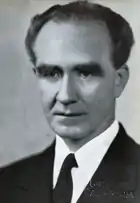 |
Frank Murphy | January 1, 1937 – January 1, 1939 |
Democratic | 1936 | Leo J. Nowicki | ||
| 36 |  |
Frank Fitzgerald | January 1, 1939 – March 16, 1939 |
Republican | 1938 [lower-alpha 9] |
Luren Dickinson | ||
| 37 |  |
Luren Dickinson | March 16, 1939 – January 1, 1941 |
Republican | Succeeded from Lieutenant Governor |
Matilda Dodge Wilson | ||
| 38 |  |
Murray Van Wagoner | January 1, 1941 – January 1, 1943 |
Democratic | 1940 | Frank Murphy | ||
| 39 |  |
Harry Kelly | January 1, 1943 – January 1, 1947 |
Republican | 1942 | Eugene C. Keyes | ||
| 1944 | Vernon J. Brown | |||||||
| 40 | _(cropped).jpg.webp) |
Kim Sigler | January 1, 1947 – January 1, 1949 |
Republican | 1946 | Eugene C. Keyes | ||
| 41 |  |
G. Mennen Williams | January 1, 1949 – January 1, 1961 |
Democratic | 1948 | John W. Connolly | ||
| 1950 | William C. Vandenberg[lower-alpha 8] | |||||||
| 1952 | Clarence A. Reid[lower-alpha 8] | |||||||
| 1954 | Philip Hart | |||||||
| 1956 | ||||||||
| 1958 | John Swainson | |||||||
| 42 | .png.webp) |
John Swainson | January 1, 1961 – January 1, 1963 |
Democratic | 1960 | T. John Lesinski[lower-alpha 10] | ||
| 43 | 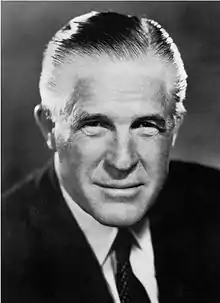 |
George W. Romney | January 1, 1963 – January 22, 1969 |
Republican | 1962 | |||
| 1964 | William Milliken | |||||||
| 1966 [lower-alpha 11][lower-alpha 12] | ||||||||
| 44 |  |
William Milliken | January 22, 1969 – January 1, 1983 |
Republican | Succeeded from Lieutenant Governor |
Thomas F. Schweigert | ||
| 1970 | James H. Brickley | |||||||
| 1974 | James Damman | |||||||
| 1978 | James H. Brickley | |||||||
| 45 | .jpeg.webp) |
James Blanchard | January 1, 1983 – January 1, 1991 |
Democratic | 1982 | Martha Griffiths | ||
| 1986 | ||||||||
| 46 | .jpeg.webp) |
John Engler | January 1, 1991 – January 1, 2003 |
Republican | 1990 | Connie Binsfeld | ||
| 1994 | ||||||||
| 1998 | Dick Posthumus | |||||||
| 47 |  |
Jennifer Granholm | January 1, 2003 – January 1, 2011 |
Democratic | 2002 | John D. Cherry | ||
| 2006 | ||||||||
| 48 | 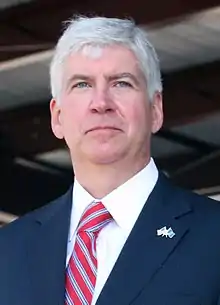 |
Rick Snyder | January 1, 2011 – January 1, 2019 |
Republican | 2010 | Brian Calley | ||
| 2014 | ||||||||
| 49 | _(cropped).jpg.webp) |
Gretchen Whitmer | January 1, 2019 – Incumbent[lower-alpha 13] |
Democratic | 2018 | Garlin Gilchrist | ||
Succession
Other high offices held
Several governors also held other high positions within the state and federal governments. Eight governors served as U.S. House of Representatives members, while seven held positions in the U.S. Senate, all representing Michigan. Others have served as ambassadors, U.S. Cabinet members, and state and federal Supreme Court justices.
- * Denotes those offices for which the governor resigned the governorship.
| Governor | Gubernatorial term | Other offices held | Source |
|---|---|---|---|
| Lewis Cass | 1813–1831 (territorial) | President pro tempore of the Senate, Ambassador to France, U.S. Secretary of War, U.S. Secretary of State, Democratic Party candidate for President of the U.S. (1848) | [20] |
| William Woodbridge | 1840–1841 | Territorial Delegate; United States Senator (March 4, 1841 – March 4, 1847) | [21] |
| Robert McClelland | 1852–1853 | U.S. Secretary of the Interior* | [22] |
| Russell A. Alger | 1885–1887 | U.S. Secretary of War | [23] |
| Wilber M. Brucker | 1931–1933 | U.S. Secretary of the Army | [24] |
| Frank Murphy | 1937–1939 | High Commissioner to the Philippines, U.S. Attorney General, Associate Justice of the Supreme Court, Governor-General of the Philippines | [25] |
| G. Mennen Williams | 1949–1961 | Ambassador to the Philippines, Justice of the Michigan Supreme Court | [26] |
| George W. Romney | 1963–1969 | U.S. Secretary of Housing and Urban Development* | [27] |
| James Blanchard | 1983–1991 | Ambassador to Canada | [28] |
| Jennifer Granholm | 2003–2011 | U.S. Secretary of Energy | [29] |
Living former governors of Michigan
As of November 2022, there are four living former governors of Michigan. The most recent death of a former governor was that of William Milliken (served 1969-83) on October 18, 2019, aged 97. Milliken was also the most recently serving governor of Michigan to have died. The state's living former governors are:
| Governor | Gubernatorial term | Date of birth (and age) |
|---|---|---|
| James Blanchard | 1983–1991 | August 8, 1942 |
| John Engler | 1991–2003 | October 12, 1948 |
| Jennifer Granholm | 2003–2011 | February 5, 1959 |
| Rick Snyder | 2011–2019 | August 19, 1958 |
Notes
- Porter died in office; as territorial secretary, Mason acted as governor until a replacement was appointed.[10]
- Horner was appointed Secretary and Acting Governor to replace Stevens T. Mason. In October 1835, Michigan authorized a state constitution and elected Mason as governor of the new state, although the state was not admitted until 1837. Horner was mostly ignored by the people of Michigan and resigned to be Secretary of Wisconsin Territory in July 1836.[11]
- Lieutenant governors represented the same party as their governor unless noted.
- Woodbridge resigned to take an elected seat in the United States Senate; as lieutenant governor, Gordon acted as governor for the remainder of the term.
- Felch resigned to take an elected seat in the United States Senate; as lieutenant governor, Greenly acted as governor for the remainder of the term.
- After a new state constitution was drafted in 1850, McClelland was elected to a single one-year term in 1851. He was then re-elected to a full two-year term in 1852.[19]
- McClelland resigned to be United States Secretary of the Interior; as lieutenant governor, Parsons acted as governor for the remainder of the term.
- Represented the Republican Party.
- Fitzgerald died in office; as lieutenant governor, Dickinson acted as governor for the remainder of the term.
- Represented the Democratic Party.
- This was the first four-year term under the new constitution.
- Romney resigned to be United States Secretary of Housing and Urban Development; as lieutenant governor, Milliken succeeded him.
- Whitmer's first term expires on January 1, 2023.
References
- General
- "Former Governor Biographies: Michigan". National Governors Association. Retrieved January 1, 2013.
- "Chronology of Michigan History" (PDF). Michigan Manual 2003–2004. Michigan Legislative Council. Retrieved January 2, 2013.
- Constitutions
- "Constitution of 1835". Michigan Legislative Council. Retrieved January 4, 2012.
- "Constitution of 1850". Michigan Legislative Council. Retrieved January 4, 2012.
- "Constitution of 1908". Michigan Legislative Council. Retrieved November 19, 2018.
- "Constitution of 1963". Michigan Legislative Council. Retrieved January 3, 2013.
- Specific
- Macomb, Alex (1837). "No. 20: Letter from Major General Macomb, to His Excellency the Governor of Michigan, Accompanying a Copy of Military Tactics". Documents Accompanying the Journal of the Senate. Detroit: John S. Bagg, State Printer. p. 167 – via Google Books.
- 1963 Michigan Constitution, Article 5, Section 12
- 1963 Michigan Constitution, Article 5, Section 8
- 1963 Michigan Constitution, Article 5, Section 19
- 1963 Michigan Constitution, Article 5, Section 15
- 1963 Michigan Constitution, Article 5, Section 14
- 1963 Michigan Constitution, Article 5, Section 2
- "Chronology of Michigan History" (PDF). Michigan Manual 2003–2004. Michigan Legislative Council. pp. 1–5. Retrieved January 1, 2013.
- "Laws of Illinois Territory". Western Illinois University. Retrieved January 2, 2013.
- Dunbar, Willis F. & May, George S. (1995). Michigan: A History of the Wolverine State (Third Revised ed.). William B. Eerdmans Publishing Company. pp. 276–78. ISBN 9780802870551.
- Dunbar, Willis F. & May, George S. (1995). Michigan: A History of the Wolverine State (Third Revised ed.). William B. Eerdmans Publishing Company. pp. 208–11. ISBN 9780802870551.
- 1835 Const. art. V, § 1
- MI Const. art. V, § 21
- MI Const. art. V, § 30
- MI Const. art. V, § 26
- 1835 Const. art. V, § 13
- "Executive Branch". State of Michigan. Retrieved January 3, 2013.
- 1835 Const. art. V, § 3
- Gardner, Washington (1913). History of Calhoun County, Michigan. Lewis Pub. Co. p. 220.
robert mcclelland michigan governor.
- "Cass, Lewis (1782–1866)". Biographical Dictionary of the United States Congress. Clerk of the United States House of Representatives and Historian of the United States Senate. Retrieved January 1, 2013.
- "Woodbridge, William (1780–1861)". Biographical Dictionary of the United States Congress. Clerk of the United States House of Representatives and Historian of the United States Senate. Retrieved January 1, 2013.
- "McClelland, Robert (1807–1880)". Biographical Dictionary of the United States Congress. Clerk of the United States House of Representatives and Historian of the United States Senate. Retrieved January 1, 2013.
- "Alger, Russell Alexander (1836–1907)". Biographical Dictionary of the United States Congress. Clerk of the United States House of Representatives and Historian of the United States Senate. Retrieved January 1, 2013.
- "Michigan Governor Wilbur Marion Brucker". National Governors Association. Retrieved January 1, 2013.
- "Michigan Governor Frank Murphy". National Governors Association. Retrieved January 1, 2013.
- "Michigan Governor Gerhard Mennen Williams". National Governors Association. Retrieved January 1, 2013.
- "Michigan Governor George Wilcken Romney". National Governors Association. Retrieved January 2, 2013.
- "Blanchard, James Johnston (1942–)". Biographical Dictionary of the United States Congress. Clerk of the United States House of Representatives and Historian of the United States Senate. Retrieved January 1, 2013.
- "Roll Call Vote No. 66". United States Senate. United States Senate.